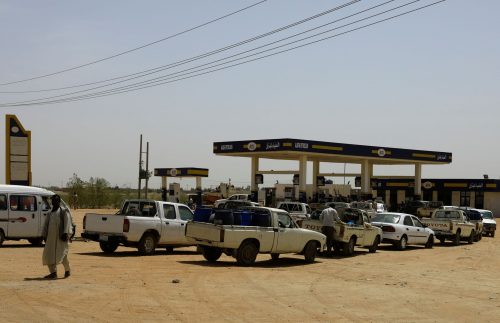Gasoline prices fell in Sudan during January, coinciding with the decline in average global oil prices.
Gas stations in the capital, Khartoum, and all Sudanese states, in the early hours of this morning, Thursday, January 12, 2023, raised on their billboards the new fuel prices, which witnessed a significant decline in the price of gasoline and an increase in the price of diesel.
Yesterday evening, Wednesday, the Ministry of Energy and Oil announced gasoline prices in Sudan for the month of January, recording a decline of more than 100 Sudanese pounds ($0.17).
Fuel prices in Sudan for the month of January
The announcement of gasoline prices in Sudan came within the framework of the policy of the Ministry of Energy and Oil to review the monthly fuel prices according to the international prices of petroleum products.
The ministry said that it was decided to adjust the prices of petroleum products (gasoline and gasoline) starting from Thursday, January 12, 2023, at 7 am local time.

The fuel prices in Sudan for the month of January (2023), which are to be implemented in the stations of Khartoum State, are as follows:
- The price of a liter of petrol fell to 506 pounds instead of 620 Sudanese pounds.
- The price of a liter of gasoline-diesel increased to 628 pounds instead of 600 pounds.
(US dollar = 569 Sudanese pounds)
The Ministry of Energy and Oil stated that the pricing of the state of Khartoum will be a reference for all states of Sudan, noting that the announced fuel prices include the fees of the state of Khartoum, amounting to 8 pounds / liter.
Last December, fuel prices in Sudan witnessed a decline in diesel prices, with the price of gasoline being fixed compared to November prices.
Fuel pricing mechanism in Sudan
Since June 2021, Sudan has worked to completely liberalize fuel prices, with companies importing oil derivatives fixing the price from time to time.
The Ministry of Energy and Oil stated that pricing is based on the average international oil prices according to the pricing date, indicating its commitment to the service line for the benefit of the citizen, and confirming the stable availability of all petroleum products in the local market.
International oil prices recorded a decline last December, as the two benchmarks (Brent and US West Texas) fell by 1.2% and 0.5%, respectively.
The pricing process is subject – according to the decision to cancel subsidies – to the import cost, which constitutes between 71% and 75% of the fuel price, in addition to transportation costs, port fees, value-added tax, and the profit margin of the distribution companies, and these costs together constitute between 25% and 29% of the fuel price. Selling to the consumer.
related topics..
Also read..

Leave a Reply